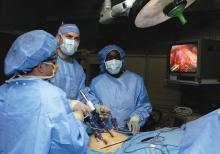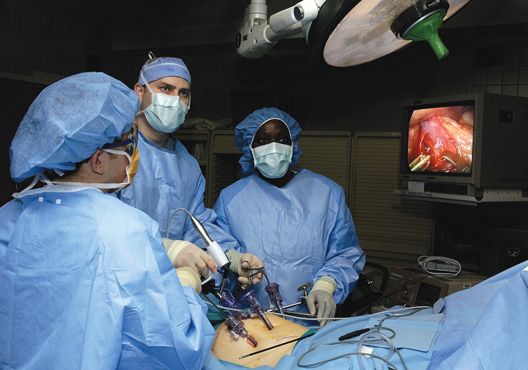User login
according to findings published in JAMA Surgery.
In a systematic review of 43,870 female patients in 55 studies, the recurrence rate was 1.2% after laparoscopic repair, compared with 2.4% after open repair. The recurrent hernia was a femoral hernia in 40.9% of patients after open repair, compared with no recurrences after laparoscopic repair, reported Line Schmidt of the department of surgery at Herlev (Denmark) Hospital, and coauthors.
Patients were women aged 18 years and older who had repair of a primary unilateral or bilateral inguinal hernia. The review included all retrospective cohort studies, prospective cohort studies, prospective clinical trials, and retrospective cohort studies with 20 or more women with inguinal hernias. PubMed, Embase, and the Cochrane Library databases were searched. The primary outcome was recurrence rate after primary laparoscopic and open repairs, with or without mesh.
The overall recurrence rate among women was 2.6%. The overall crude recurrence rate for studies with low risk of bias was 3.9%, the authors wrote. A femoral hernia was found in 43% of reoperations, though in one study including both open and laparoscopic repairs in women, the rate of detection of incidental femoral hernia was only 2%.
The results “support the recommendation that women with inguinal hernias should undergo laparoscopic repair, unless there are concerns where an open repair might be more clinically appropriate,” the authors wrote. “A substantial number of recurrences after open repair were femoral hernias that may have been overlooked at the primary operation.”
Authors reported receiving personal fees from Bard and Merck. No other disclosures were reported.
SOURCE: Schmidt L et al. JAMA Surg. 2018;153(12):1135-42.
according to findings published in JAMA Surgery.
In a systematic review of 43,870 female patients in 55 studies, the recurrence rate was 1.2% after laparoscopic repair, compared with 2.4% after open repair. The recurrent hernia was a femoral hernia in 40.9% of patients after open repair, compared with no recurrences after laparoscopic repair, reported Line Schmidt of the department of surgery at Herlev (Denmark) Hospital, and coauthors.
Patients were women aged 18 years and older who had repair of a primary unilateral or bilateral inguinal hernia. The review included all retrospective cohort studies, prospective cohort studies, prospective clinical trials, and retrospective cohort studies with 20 or more women with inguinal hernias. PubMed, Embase, and the Cochrane Library databases were searched. The primary outcome was recurrence rate after primary laparoscopic and open repairs, with or without mesh.
The overall recurrence rate among women was 2.6%. The overall crude recurrence rate for studies with low risk of bias was 3.9%, the authors wrote. A femoral hernia was found in 43% of reoperations, though in one study including both open and laparoscopic repairs in women, the rate of detection of incidental femoral hernia was only 2%.
The results “support the recommendation that women with inguinal hernias should undergo laparoscopic repair, unless there are concerns where an open repair might be more clinically appropriate,” the authors wrote. “A substantial number of recurrences after open repair were femoral hernias that may have been overlooked at the primary operation.”
Authors reported receiving personal fees from Bard and Merck. No other disclosures were reported.
SOURCE: Schmidt L et al. JAMA Surg. 2018;153(12):1135-42.
according to findings published in JAMA Surgery.
In a systematic review of 43,870 female patients in 55 studies, the recurrence rate was 1.2% after laparoscopic repair, compared with 2.4% after open repair. The recurrent hernia was a femoral hernia in 40.9% of patients after open repair, compared with no recurrences after laparoscopic repair, reported Line Schmidt of the department of surgery at Herlev (Denmark) Hospital, and coauthors.
Patients were women aged 18 years and older who had repair of a primary unilateral or bilateral inguinal hernia. The review included all retrospective cohort studies, prospective cohort studies, prospective clinical trials, and retrospective cohort studies with 20 or more women with inguinal hernias. PubMed, Embase, and the Cochrane Library databases were searched. The primary outcome was recurrence rate after primary laparoscopic and open repairs, with or without mesh.
The overall recurrence rate among women was 2.6%. The overall crude recurrence rate for studies with low risk of bias was 3.9%, the authors wrote. A femoral hernia was found in 43% of reoperations, though in one study including both open and laparoscopic repairs in women, the rate of detection of incidental femoral hernia was only 2%.
The results “support the recommendation that women with inguinal hernias should undergo laparoscopic repair, unless there are concerns where an open repair might be more clinically appropriate,” the authors wrote. “A substantial number of recurrences after open repair were femoral hernias that may have been overlooked at the primary operation.”
Authors reported receiving personal fees from Bard and Merck. No other disclosures were reported.
SOURCE: Schmidt L et al. JAMA Surg. 2018;153(12):1135-42.
FROM JAMA SURGERY

